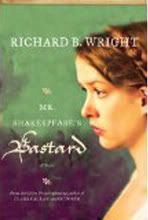Book Review: Mr. Shakespeare’s Bastard by Richard B. Wright
Richard B. Wright’s 2001 novel, Clara Callan was a masterpiece that won Canada’s two most prestigious literary awards – the Governor General’s Award and the Giller Prize.
 I have tried to not to measure the author’s subsequent works by that book, but I admit that my expectations were high when I started his latest offering, Mr. Shakespeare’s Bastard
I have tried to not to measure the author’s subsequent works by that book, but I admit that my expectations were high when I started his latest offering, Mr. Shakespeare’s Bastard.
Unfortunately, this book fell far short of my expectations and I finished it mainly because it was this month’s choice for our local book club, The Loquacious Compendium.
From the dust jacket:
In failing health, Aerlene Ward, an elderly housekeeper in an Oxfordshire manor, feels compelled to confess the great secret that has shaped her life: she is the illegitimate daughter of William Shakespeare, England’s most famous playwright. But will anyone believe her? Even Charlotte, the young mistress of the house who is writing Aerlene’s words down, is doubtful.
Wright tells a plausible story about Aerlene’s mother meeting and mating with Shakespeare. I’d be very surprised if the real Shakespeare didn’t have more “bastards”, so that revelation in itself is certainly not enough to carry this story. In fact, my complaint about this book is that there is no story. What happens is summed up on the dust jacket.
That said, there were some in our book club who agreed with this blurb:
With a brilliant eye and ear for this rich period of history, Richard B. Wright vividly evokes the seasonal rhythms of rural life in Oliver Cromwell’s England and the teeming streets of Shakespeare’s London as he interweaves the two women.
Certainly, Wright captures the female point of view beautifully and uses it often in his writing. This book is no exception. It’s easy to forget as one reads about Aerlene & her mother Elizabeth that the book has a male author. The female voice is amazingly authentic.
 But the blurb also promises that “secrets are revealed, mysteries are uncovered, and futures are forever changed.” Sorry, I didn’t see that. What you’ve found out here is what happens. It’s a glimpse at seventeenth century England, especially London. There’s a brief introduction to Shakespeare, although he plays a minor role and is used mainly as a plot device (and title).
But the blurb also promises that “secrets are revealed, mysteries are uncovered, and futures are forever changed.” Sorry, I didn’t see that. What you’ve found out here is what happens. It’s a glimpse at seventeenth century England, especially London. There’s a brief introduction to Shakespeare, although he plays a minor role and is used mainly as a plot device (and title).
Since the book is well-written, it was suggested at our book club discussion that it might be a good Young Adult choice. However, Elizabeth’s morals leave much to be desired and her actions might not be appropriate reading for that age group.
Overall, I was very disappointed by Mr. Shakespeare’s Bastard, but you might be an historical fiction fan who will find it:
An engaging blend of invention and historical detail, a novel full of imagination and delicate emotion.
Many in The Loquacious Compendium did.
Links for my Canadian readers:
P.S. If you click through the affiliate links in the book titles, you may notice a different cover. I like to see the cover that’s on the copy I read – and it’s usually different than Amazon.com because they display the American release, and I read the Canadian. Again, the links are affiliate links so I will receive a small percentage of any purchase you make after clicking through from this blog.


Thanks for the review. This book was my pick for my book club which I’m hosting on Thursday night. I won’t say I LOVED it, but I did really like it. I love historical fiction — and I usually love Richard Wright, so the two seemed like a good fit.
I just wondered, if you have a moment out there in rural NS, if you have any questions that you could share with me to assist in our book club discussion. We generally use standard ones, but I like to look for book-specific ones (without doing the actual work of coming up with the questions!).
Thanks in advance!
Andrea Douglas
Downtown Ottawa
Hi Andrea, I’m replying to you in a separate e-mail. Thanks for dropping by my blog!
Underneath the narrative about the history of Aerlene and her mother and their parallel lines, years apart, in London, is a fairly timeless portrait of the prophane (read humane) and the puritan…both religious and literary. Aerlene and her mother take liberties with the literal (bible and biblio): their truth is never simple but always more interesting. That is, ultimately, their connection with the Bard, as lover and as father. Readers are always more interesting than the righteous. An absorbing novel.